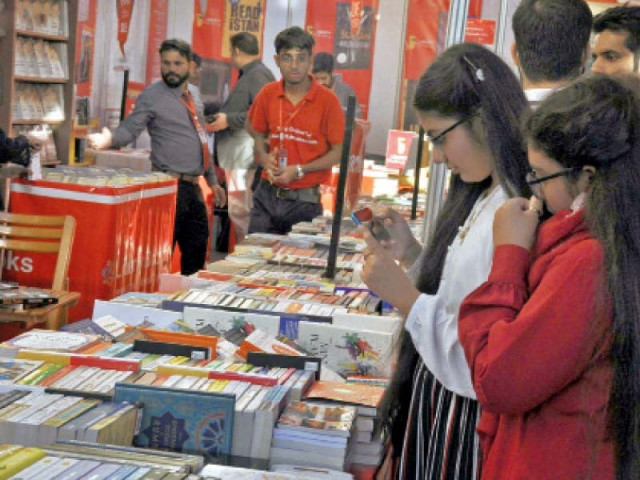Book lovers hit hard by import bans
Albeit digital reading is a cost-effective option, it threatens bookstores and bibliophiles alike

The precarious state of the economy and the high dollar rate has upended the purchasing power of the populace and amongst the victims of the prevalent, think twice before you buy, attitude of the average consumer are books.
Couple with the rapidly declining buying power with banks finding it hard to issue letters of credit (LC) to importers, on account of low foreign exchange reserves, and the current scenario is nightmarish for bibliophiles and students, who cannot find the books of their choice even if they are willing to pay the steep prices.
“For the past several weeks, no books are being imported into the country and whatever little stock we had left is slowly running out,” informed Aziz Khalid, Chairman of Pakistan Publishers and Booksellers Association. “The situation impacts both avid readers and students as they can neither buy books for leisurely reading nor for their coursework.” Amongst the adversely impacted is Mian Asif, who was quizzing the staff at a bookstore in Islamabad about the availability of a book on his daughter’s behalf.
“This is my third day of visiting nearly every bookstore in the city and I cannot find the book my daughter needs,” said a visibly frustrated Asif, adding that the exercise had become a headache because the teachers were insisting on the particular book.Raja Mubeen Akhtar, who was browsing another bookstore in the federal capital with his 9-year-old daughter in tow, shares Asif’s frustrations. “It is not just that books are not available, the prices have gone up exponentially as well,” said Akhtar, “and since my daughter loves to read we now have to compromise on the number of books I can get her.”
Bibliophiles like Akhtar’s daughter not being able to afford as many books as they used is weighing heavy on book shop owners as well. Yar Muhammad, who runs a bookstore on Arbab Road in Peshawar, said that it was already hard running a store at a time when the book reading population had declined “and now with books not being available, whatever little consumer base I have left will vanish.” Agreeing with Muhammad’s observation, Shafeeq Gigyani, who organises a monthly book circle in Peshawar, implored the government to step in and facilitate book importers and bookstore owners.
“We are already a nation which reads very little and if the access to whatever little we are reading is cut off then we will be in an even worse position than we are today both economically and soft image wise,” remarked Gigyani. However, Hassan Mirza, an anthropology and sociology student from Lahore, feels that in the current era of technology one does not need to solely rely on physical copies of books to read. “For instance, I can easily read many pages in one go while scrolling on my phone. This is convenient because I can even annotate and highlight the text which is important,” said Mirza.
Concurring with Mirza, Musa Khokhar, who is enrolled at a university in Lahore for politics and economics, said that reading digitally is much more convenient and cheaper. While digital reading may be more convenient, Dr Syeda Anjum Ara Alvi, a Professor at Lahore University of Management Sciences (LUMS), feels that it has aided superficial learning and led to the disappearance of the book culture. “In the past, students would read multiple books on a wide variety of subjects in order to pass an exam, but now they just skim through a text on their gadgets, without gaining an in-depth understanding of the subject matter,” opined Dr Alvi, adding that technology had also reduced the attention span of the students since it was very easy to get distracted.
Talha Baseer, another bibliophile who was browsing a bookstore in Islamabad, agreeing with Dr Alvi, said that reading from a physical book meant he retained much more information. “However, if the current situation persists and books keep getting pricier, then I might have no other option but to read digitally.”
The prospect of readers going digital worries Saleem Hussain, Chairman of a renowned bookstore in Karachi. “The total import of books into Pakistan is a measly 0.26 per cent, which will not impact our foreign reserves, so the government should really reconsider the import policy regarding books.”
Nasir Hussain, Director of Publishers Marketing Associates (PMA), agreeing with Hussain, requested the government to take action. “We will also write a letter to the Federal Finance Minister and the State Bank of Pakistan to convey the gravity of the matter,” informed Hussain while talking to the Express Tribune.



















COMMENTS
Comments are moderated and generally will be posted if they are on-topic and not abusive.
For more information, please see our Comments FAQ